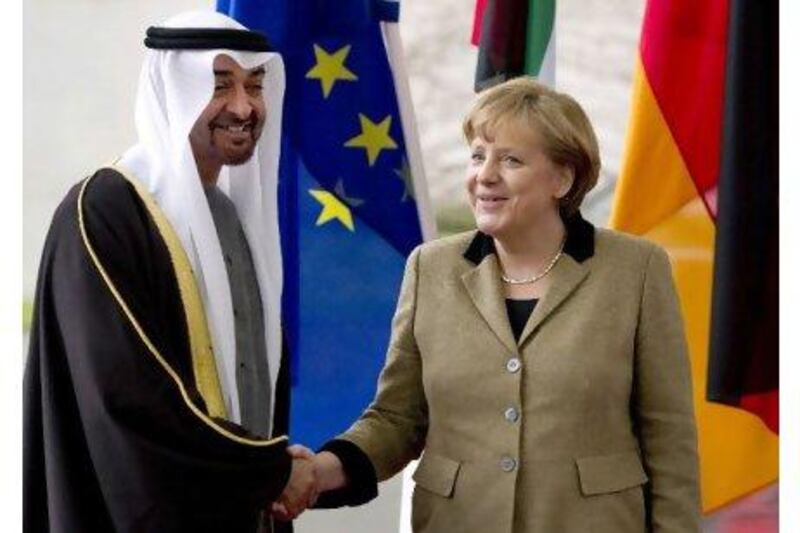BERLIN // Sheikh Mohammed bin Zayed, Crown Prince of Abu Dhabi, met the German chancellor, Angela Merkel, yesterday for talks on issues including the nuclear standoff with Iran and the situation in Syria.
"The topics discussed were bilateral relations, possibilities for cooperation in the economy, energy, the environment, education and research," a spokeswoman for the German government said.
"The dispute over the Iranian nuclear programme and the situation in Syria were of particular interest."
The European Union imposed sanctions on seven Syrian cabinet ministers on Tuesday for their roles in the bloody crackdown on the opposition, in the latest move aimed at pressuring the president, Bashar Al Assad, to step down.
Sheikh Mohammed, also the Deputy Supreme Commander of the Armed Forces, and Mrs Merkel had lunch together but no details of the discussions were given.
There was no comment on whether they had talked about the euro crisis or a possible financial contribution by the UAE towards bailout funds for struggling economies in the single- currency area.
The EU has been trying to secure support for the euro rescue from leading economies outside the bloc, especially China, as the crisis enters its third year with no sign of abating.
There are growing doubts in Germany, Europe's largest economy, about whether the crisis management is working.
An opinion poll published in the Bild am Sonntag newspaper this week showed almost two thirds of Germans, 62 per cent, were opposed to granting more aid to Greece. Mrs Merkel faced a backbench revolt on Monday in a parliamentary vote on a second, €130 billion (Dh638.76bn) rescue package for the beleaguered southern European nation.
The bill was passed with a large majority thanks to opposition support, but the chancellor fell short of the symbolically important absolute majority of all seats in parliament.
Commentators say Mrs Merkel has been politically weakened by dissent in her centre-right coalition, and by signs of a rift in her cabinet on euro policy.
Her position has been complicated further by Ireland's decision on Tuesday to hold a referendum on the new EU fiscal discipline pact she had hoped would be implemented quickly, and which represents a cornerstone of her strategy to end the debt crisis.
Germany has long been wooing investors from Gulf states including the UAE, which it values as reliable, long-term partners.
Recently, Etihad came to the rescue of Air Berlin when it agreed in December to become the largest single shareholder, with a stake of almost 30 per cent and a €73 million injection of capital.
The investment has led to strategic cooperation including codesharing and will help Etihad to expand its business in Europe.
Germany is also hoping the UAE will become involved in offshore wind-farm projects that have been suffering delays because undersea cables linking the turbines to the mainland grid are behind schedule.
Masdar, the green energy company owned by the Abu Dhabi Government, has said it may be interested in investing in German offshore wind power if the returns improve.






